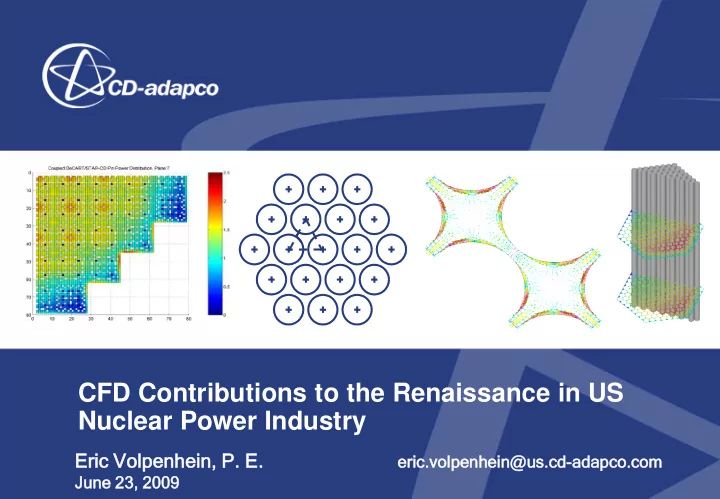

CFD Contributions to the Renaissance in US Nuclear Power Industry Eri ric V Vol olpenhei penhein, n, P P. E. eric.vo volpen penhei hein@ n@us. us.cd cd-adap dapco co.co com June 23, une 23, 2009 2009
30 years ago…. • Most severe accident in commercial nuclear power industry (Three Mile Island) – No significant release and no injuries – Awakening to the importance of human factors • Received BS Nuclear Engineering….oops! 2
Next 30 years…. • No nuclear plants ordered for the US Market • More plants cancelled than built • Nevertheless, until recently, power from nuclear increased each year at a faster pace than during the peak period of plant startup – power up-ratings, increased capacity factors (extended fuel cycles, outage management, preventative maintenance, root cause investigations, and rigorous risk management) • New licensing process [COL] developed • International shift in technology and resources 3
And nd Tod Today ay?
Status of New Reactors in US 5
Other Recent Developments DOE guaranteed loans to four companies for estimated 7 • new nuclear reactors on-line by 2016 (May 2009) Shaw Group receives full notice to proceed on two new • reactors from Southern Nuclear. These will serve as the Reference COL for Westinghouse / Toshiba AP1000 (April 2009) – Progress Energy (Jan 2009) – SCANA / Santee Cooper (May 2008) 6
STAR-CCM+ / CD Licensing Revenue U.S. Nuclear Industry 5 4 Normalized Revenue 3 2 1 0 2003 2004 2005 2006 2007 2008 2009 7
But ut….
Formidable challenges remain…. “We may not need any new [large base load] plants, ever!” – Jon • Wellinghoff, chairman Federal Energy Regulatory Commission, April 22, 2009 Yucca Mountain project effectively stopped • Price of fossil fuels highly volatile => public support for nuclear power is • high but decreasing Uncertainty in financial markets • Carbon cap & trade evolving • Safety & security • Waste management • 9
Applications in the Nuclear Pow er Industry
Nuclear Fuel Assembly 11
Fuel Performance CHF Prediction Nuclear fuel design Pea Peak Pow Power Per Performance Loca cal Fl Flow De Deta tail Heat T Transf sfer Optimi mization 12
Phenomenological Investigations – Anisotropic Turbulence and Unsteady Flow The reproduction of the large scale oscillations in the numerical simulation, combined with the accurate anisotropic modeling lead to excellent agreement with experimental results. Nuclear fuel design 1.5 τ rel 1 Experimental Standard k- ε Anisotropic k- ε (steady calc.) Anisotropic k- ε (Unsteady) 0.5 0 5 10 15 20 25 30 θ degrees 13
Coupled CFD / Neutronics (Courtesy ANL) Power Density Void Fraction Nuclear fuel design ¼ core height Core Exit 14
Spent Fuel Transfer Cask Simulation Spent Fuel Storage and Transportation Heat Transfer in Spent Fuel Transfer Cask Neutron Shields Courtesy of: J.A. Fort, Pacific Northwest National Laboratory 15 C. Bajwa, U.S. Nuclear Regulatory Commission
Spent Fuel Storage Spent Fuel Storage and Transportation Continuous modification of storage inventory. Varying decay heat and design of casks. Varying external conditions. Requires periodic re-evaluation of flow and thermal conditions. 16
Spent Fuel Storage Accurate storage simulations can • be run in 24 hrs. The process can be fully • automated for run and report. 17
Boron Distribution Mixing 18 18
Thermal Stratification, Cycling, and Striping - Industrial LES Capability of introducing 3-dimensional structures at turbulent inlets. Choice of efficient and validated subgrid scale models (WALE). Adequate fully automated grid Mixing generation. Availability of resolved wall as well as all Y+ implementations. 1 ar Scalar 0.9 ve S 0.8 sive 0.7 e Passi 0.6 age P 0.5 Averag 0.4 0.3 0.2 0.1 0 0 0.02 0.04 0.06 19
Thermal Stratification, Cycling, and Striping - URANS Approach E. Merzari, H. Ninokata, E. Baglietto - 2008 The he incoher oherent t ent term is rel elated ated to to the the fl fluc uctu tuation of of Large e scal ale e struc uctur ures are con oncentr trati tion gi given en by by the the inher nherent natur t nature of of computed by URA RANS NS turbul ulenc ence. e. (coher oheren ent term) Addi dditional equa equation for or the he tran ansport of of the he var ariance of of the he scalar conc ncen entration. on. Mixing 20
Safety injection / thermal mixing Safety injection during LOCA VOF model with HRIC Gas Entrainment 21 21
Free-surface vortices E. Merzari, H. Ninokata, Tokyo Institute of Technology E. Baglietto, CD-adapco Gas Entrainment 22 22
Jet Pump Model Validation / Calibration P in Component Performance P 1 P 2 Jet Pump Validation P 3 STAR-CD ∆ P err (%) Location Diff = = P in -0.006 -1.4% P 1 -0.001 -0.2% P 2 -0.018 -3.1% P 3 23 23
Steam Separator Component Performance 24
Pressurizer Heater Rods Component Performance 25
Containment Hydrogen – STAR-CCM+ and DARS Hydrogen Deflagration 1000 Experiment 800 600 400 200 0 0 5 10 Flam ame Speed peed 26
High Temperature Gas Reactor Licensing Next Generation Nuclear Plant 27
Advanced Burner Reactor Advanced Fuel Cycle Initiative Cou ourtesy of of R. Wigel geland & & K. K. Ham amman, I INL, L, t to o be be pr pres esented at at Gl Global 2009 2009, Par Paris, F Fran ance 28
High Performance CFD / FEA In Nuclear Engineering Com ompl plex ex Phy hysics cs + N Neutr eutron onics + C Conjugat ugate e heat heat tr trans ansfer + B Boil ilin ing Two o phas phase fl flow ow + LES + L ES Sing ngle phas phase fl flow ow Com ompl plex ex Com ompl plete te fuel fuel Chann hannel Whol hole c cor ore Spac acer er assem embl bly Geome metry ry 29
Recommend
More recommend